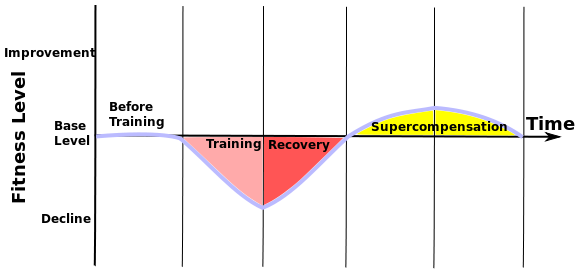The Ragnar Trail Relay is next weekend, June 9-10. My workouts are now getting a little easier and a little shorter. Runs will continue to ease up with the expectation that I will peak for the race, feel good, and perform my best.
The past four weeks have been very challenging. My coach has been prescribing longer runs and runs with specific hard-effort drills. Hard runs have been on Tuesdays, Thursdays and Saturdays. Easier efforts have been on Mondays and Saturdays with rest days on Wednesdays and Fridays.
HRV
It has been interesting to watch my heart rate variability (HRV) as my training has progressed. Briefly, HRV is used to measure training status. With HRV, I can see if I’m fully recovered and ready to train hard (green), somewhat fatigued and in need of a light workout (orange), or very fatigued and in need of rest (red).
The art of overreaching
Typically, one should adhere to the green/orange/red training recommendations shown by the HRV app. Most days it’s a good idea to train hard if one is fully recovered, to back off if one is tired, and to rest if one is very fatigued.
There are exceptions to most rules and HRV training rules are no different. Hard training when the HRV is orange or red may be useful if applied correctly. (Overreaching is the term used for this training strategy. This article discusses overreaching on the bike but the same concepts apply to any athletic endeavor.) I have definitely been in the orange and red more often these past few weeks.
As a big, general rule, I love trail running. It’s a meditative experience, and my time out in nature is a very exciting yet calming experience for me. Some might call it spiritual.
But with a sustained increase in training, not only have my HRV scores dropped, my attitude toward running has changed. I’m not as enthusiastic about it. I often look at a workout and I think, “Ehhhh? God… What?! Hill intervals on top of other hill intervals for how long? Who thought this was a good idea?”
This shift in attitude is no surprise.Too much training, and too much hard training done for too long can result in overtraining, which is nothing anyone wants. Overtraining symptoms may include mental decline, weakness, sickness, and injury. Overtraining may take months and potentially years to overcome, and overtraining is partway down the road to death! Apathy is part of my nervous system’s way of protecting me.
I’ve experienced this diminished mental state in the past during hard training but it’s interesting to analyze it alongside both the coach-prescribed workouts I’m doing and the HRV readings.
With no interest in either dying or being overtrained, why would I want or need to overreach?
It’s because overreaching + adequate rest = bigger & better performance. With training, we dig a hole. We beat up the organism to a certain degree. We stress muscles, bones, connective tissue, the endocrine system, circulatory system, the mind, and the nervous system in general. If we rest adequately (taper) then we should see the organism rebound, get stronger and thus be able to perform at a high level. The diagram illustrates the idea.
The value of coaching
I feel that working with a coach has been invaluable in that she is guiding me safely through these rocky training waters. She’s had me work hard enough to realize significant fitness gains and she’s kept me from working too hard and becoming overtrained. She’s said several times that she wants the hard workouts to be so hard that the race is a piece of cake. After last Sunday’s 2.5- hour, 12.4-mile gruel-fest through Golden, CO, I can say that I believe I’m firmly on the right track and that the Ragnar Relay may actually feel like a jog in the park. Next weekend will give us the truth.

